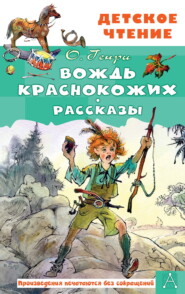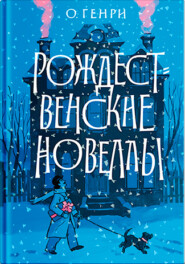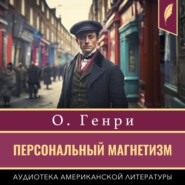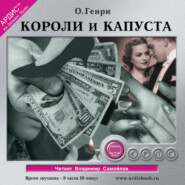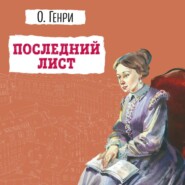По всем вопросам обращайтесь на: info@litportal.ru
(©) 2003-2024.
✖
Heart of the West
Настройки чтения
Размер шрифта
Высота строк
Поля
Ranse paid a visit to the store before going to the house. Sam Rivell was taking off his tan shoes regretting and preparing for bed.
"Any of the boys from the San Gabriel camp riding in early in the morning?" asked Ranse.
"Long Collins," said Sam briefly. "For the mail."
"Tell him," said Ranse, "to take that tramp out to camp with him and keep him till I get there."
Curly was sitting on his blankets in the San Gabriel camp cursing talentedly when Ranse Truesdell rode up and dismounted on the next afternoon. The cowpunchers were ignoring the stray. He was grimy with dust and black dirt. His clothes were making their last stand in favour of the conventions.
Ranse went up to Buck Rabb, the camp boss, and spoke briefly.
"He's a plumb buzzard," said Buck. "He won't work, and he's the low- downest passel of inhumanity I ever see. I didn't know what you wanted done with him, Ranse, so I just let him set. That seems to suit him. He's been condemned to death by the boys a dozen times, but I told 'em maybe you was savin' him for the torture."
Ranse took off his coat.
"I've got a hard job before me, Buck, I reckon, but it has to be done. I've got to make a man out of that thing. That's what I've come to camp for."
He went up to Curly.
"Brother," he said, "don't you think if you had a bath it would allow you to take a seat in the company of your fellow-man with less injustice to the atmosphere."
"Run away, farmer," said Curly, sardonically. "Willie will send for nursey when he feels like having his tub."
The /charco/, or water hole, was twelve yards away. Ranse took one of Curly's ankles and dragged him like a sack of potatoes to the brink. Then with the strength and sleight of a hammer-throw he hurled the offending member of society far into the lake.
Curly crawled out and up the bank spluttering like a porpoise.
Ranse met him with a piece of soap and a coarse towel in his hands.
"Go to the other end of the lake and use this," he said. "Buck will give you some dry clothes at the wagon."
The tramp obeyed without protest. By the time supper was ready he had returned to camp. He was hardly to be recognised in his new shirt and brown duck clothes. Ranse observed him out of the corner of his eye.
"Lordy, I hope he ain't a coward," he was saying to himself. "I hope he won't turn out to be a coward."
His doubts were soon allayed. Curly walked straight to where he stood. His light-blue eyes were blazing.
"Now I'm clean," he said meaningly, "maybe you'll talk to me. Think you've got a picnic here, do you? You clodhoppers think you can run over a man because you know he can't get away. All right. Now, what do you think of that?"
Curly planted a stinging slap against Ranse's left cheek. The print of his hand stood out a dull red against the tan.
Ranse smiled happily.
The cowpunchers talk to this day of the battle that followed.
Somewhere in his restless tour of the cities Curly had acquired the art of self-defence. The ranchman was equipped only with the splendid strength and equilibrium of perfect health and the endurance conferred by decent living. The two attributes nearly matched. There were no formal rounds. At last the fibre of the clean liver prevailed. The last time Curly went down from one of the ranchman's awkward but powerful blows he remained on the grass, but looking up with an unquenched eye.
Ranse went to the water barrel and washed the red from a cut on his chin in the stream from the faucet.
On his face was a grin of satisfaction.
Much benefit might accrue to educators and moralists if they could know the details of the curriculum of reclamation through which Ranse put his waif during the month that he spent in the San Gabriel camp. The ranchman had no fine theories to work out-perhaps his whole stock of pedagogy embraced only a knowledge of horse-breaking and a belief in heredity.
The cowpunchers saw that their boss was trying to make a man out of the strange animal that he had sent among them; and they tacitly organised themselves into a faculty of assistants. But their system was their own.
Curly's first lesson stuck. He became on friendly and then on intimate terms with soap and water. And the thing that pleased Ranse most was that his "subject" held his ground at each successive higher step. But the steps were sometimes far apart.
Once he got at the quart bottle of whisky kept sacredly in the grub tent for rattlesnake bites, and spent sixteen hours on the grass, magnificently drunk. But when he staggered to his feet his first move was to find his soap and towel and start for the /charco/. And once, when a treat came from the ranch in the form of a basket of fresh tomatoes and young onions, Curly devoured the entire consignment before the punchers reached the camp at supper time.
And then the punchers punished him in their own way. For three days they did not speak to him, except to reply to his own questions or remarks. And they spoke with absolute and unfailing politeness. They played tricks on one another; they pounded one another hurtfully and affectionately; they heaped upon one another's heads friendly curses and obloquy; but they were polite to Curly. He saw it, and it stung him as much as Ranse hoped it would.
Then came a night that brought a cold, wet norther. Wilson, the youngest of the outfit, had lain in camp two days, ill with fever. When Joe got up at daylight to begin breakfast he found Curly sitting asleep against a wheel of the grub wagon with only a saddle blanket around him, while Curly's blankets were stretched over Wilson to protect him from the rain and wind.
Three nights after that Curly rolled himself in his blanket and went to sleep. Then the other punchers rose up softly and began to make preparations. Ranse saw Long Collins tie a rope to the horn of a saddle. Others were getting out their six-shooters.
"Boys," said Ranse, "I'm much obliged. I was hoping you would. But I didn't like to ask."
Half a dozen six-shooters began to pop-awful yells rent the air-Long Collins galloped wildly across Curly's bed, dragging the saddle after him. That was merely their way of gently awaking their victim. Then they hazed him for an hour, carefully and ridiculously, after the code of cow camps. Whenever he uttered protest they held him stretched over a roll of blankets and thrashed him woefully with a pair of leather leggings.
And all this meant that Curly had won his spurs, that he was receiving the puncher's accolade. Nevermore would they be polite to him. But he would be their "pardner" and stirrup-brother, foot to foot.
When the fooling was ended all hands made a raid on Joe's big coffee- pot by the fire for a Java nightcap. Ranse watched the new knight carefully to see if he understood and was worthy. Curly limped with his cup of coffee to a log and sat upon it. Long Collins followed and sat by his side. Buck Rabb went and sat at the other. Curly-grinned.
And then Ranse furnished Curly with mounts and saddle and equipment, and turned him over to Buck Rabb, instructing him to finish the job.
Three weeks later Ranse rode from the ranch into Rabb's camp, which was then in Snake Valley. The boys were saddling for the day's ride. He sought out Long Collins among them.
"How about that bronco?" he asked.
Long Collins grinned.
"Reach out your hand, Ranse Truesdell," he said, "and you'll touch him. And you can shake his'n, too, if you like, for he's plumb white and there's none better in no camp."
Ranse looked again at the clear-faced, bronzed, smiling cowpuncher who stood at Collins's side. Could that be Curly? He held out his hand, and Curly grasped it with the muscles of a bronco-buster.
"I want you at the ranch," said Ranse.
"All right, sport," said Curly, heartily. "But I want to come back again. Say, pal, this is a dandy farm. And I don't want any better fun than hustlin' cows with this bunch of guys. They're all to the merry- merry."
At the Cibolo ranch-house they dismounted. Ranse bade Curly wait at the door of the living room. He walked inside. Old "Kiowa" Truesdell was reading at a table.
"Good-morning, Mr. Truesdell," said Ranse.
The old man turned his white head quickly.
"How is this?" he began. "Why do you call me 'Mr. – '?"
When he looked at Ranse's face he stopped, and the hand that held his newspaper shook slightly.






